Plastic Free Tea Bag Brands (Eco-Friendly Alternatives for Tea Lovers!)
There’s no way I can function in the morning unless I have two large cups of tea!
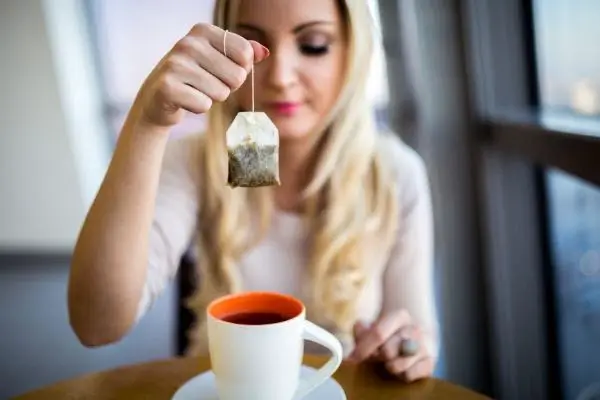
I don’t drink coffee and tea is my go-to morning drink. While I now use a lot of loose-leaf tea, I still buy tea bags for when I feel like having different flavors of herbal tea.
Looking for eco-friendly alternatives to tea was a natural fit for me. So, here is what I found out in my search for plastic free tea bag brands.
Tea is the second most popular non-alcoholic beverage. Globally, 70 billion gallons are drunk every year. If every cup of that was made using plastic-containing teabags, that is an environmental disaster in the making.
Thankfully we don’t have to give up tea to reduce our plastic use.
There are plenty of great tea options that are served without the portion of plastic on the side.
We’re going to give you a rundown of which companies use plastic-free tea bags, so no matter where you live in the world, you can have a guilt-free cuppa!
It’s Not Just Black and White
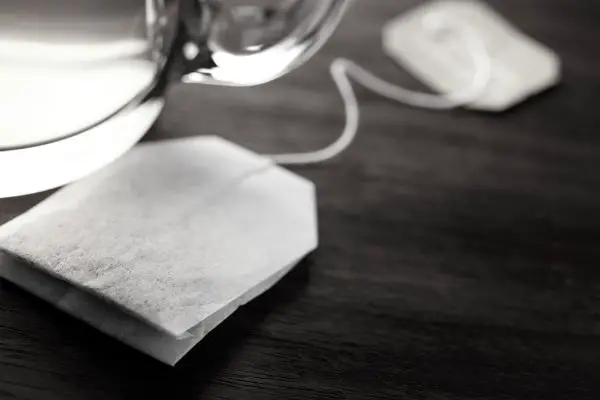
Before we start looking at the brands, it’s worth taking a bit of time to just look at some of the issues around tea bags. You might think that it’s an obvious line. The bags that contain plastic are bad. The ones that don’t are good. Unfortunately, some tea bags fall into a bit of a middle ground.
Some tea bags are made of a material called PLA (polylactic acid). PLA is an organic polymer made from plant sources. So far, it sounds good. If you look up PLA, you will even find that it’s compostable. Except- that should probably have an asterisk on it. If you put PLA tea bags into your personal composter, they will still be there years later. PLA is industrial compostable. Which means you need a lot more heat than you’ll get in a home system.
So, what does this mean? Well, PLA is better than polypropylene. This is because it uses less energy to make and doesn’t come from crude oil. However, if you want to compost your tea bags, it’s not going to be a good fit. It will only degrade if you have access to industrial composting, like through a green waste recycling service.
How Can You Tell If They Have PLA?
There were new rules brought in in 2020, which changed how companies were allowed to talk about PLA. If a company uses PLA, they can’t claim to be plastic-free. So if you want to spot a brand that uses PLA, you look for ones that say their tea bags are ‘100% plant-based and 100% compostable’ .
In the interest of helping you make the right decision, we’ll let you know not only which brands are plastic free but also which tea bags you’ll be able to throw in your compost bin as well.
Popular International Plastic Free Tea Brands
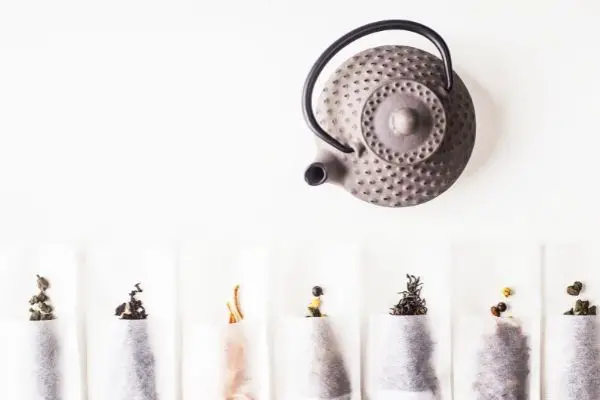
Clipper Tea
Clipper tea was the first tea brand to make a switch to a more sustainable tea bag. In 2018, they changed all of their teabags. All of their heat-sealed paper bags use PLA instead of polypropylene. It’s great that Clipper was at the forefront of leading the shift in materials. However, you do need to keep in mind that you won’t be able to compost their bags at home.
Dilmah
Dilmah started the process of changing all of their tea bags to PLA in 2020. They are a little behind schedule but hope to make a complete transition by the end of 2021. Unfortunately, this means you won’t be able to put their bags into your own compost, but they will be free of microplastics and can be put into industrial composters.
Lipton
Lipton is one of the companies that are less willing to give clear-cut answers on what their tea bags are made of. However, it does seem that there is a mix of materials being used between their different offerings. For example, some of their bags are made of only hemp and cellulose fibers, while others also have thermoplastic fibers infused into them.
Pukka
One of the most sustainable tea brands on this list is Pukka. It’s one of the more prominent brands, so it’s nice to see that they have gone all the way with making a genuinely plastic free tea bag. The bags are made from 99% paper held together with 1% natural resin. The bags are not heat-sealed, so there is no need for plastic or even PLA. Instead, the bags are sewn together with organic cotton. If you’re looking for a teabag that you can compost at home, then this is a great brand to turn to.
Republic of Tea
Republic of Tea is an environmentally conscious brand. They have always strived to reduce their packaging and to provide options that are as sustainable as possible. That’s why it’s not surprising to find that their tea bags are made from unbleached paper and are sewn together. In addition, they are compostable and can be composted at home.
The company has committed to becoming more sustainable but has not laid out a roadmap or any times for their planned changes.

T2
T2 is on the road to shifting all of its tea bags and packaging to be recyclable, reusable, or home compostable. This means not only are the teabags going to be able to go in your composter, but so are the larger bags for loose leaf tea. The material they are switching to for their bags can break down in either water or a home composter in around 12 weeks. At the time of writing, T2 was 90% of the way to their target.
Tea Pigs
Tea Pigs tea bags are ‘temple style’ tea bags. Since the brand came to market, they have made their teabags in the same way. They use cornstarch to make the PLA for their bags. It’s a natural material and is sustainably produced. However, it does have degradability issues, as outlined above.
Twinings
Twinings is in the process of moving all of their tea bags to be made using natural materials. They have gotten a lot of the way there. There are just a few of their ‘tag and string’ style bags that are still being transitioned. They aim to be 100% changed over by the end of 2021.
Yogi Tea
Yogi tea uses a mix of manila hemp and wood pulp for its teabags. The end result is a tea bag that you can compost at home.
Yorkshire Tea
As one of the largest brands in the world, it’s really encouraging that the company is in the process of switching away from plastics. In November 2020, 75% of the tea bags they produced were using PLA instead of polypropylene. They hope to finish their change over in the first half of 2021.
Friendship Organics Tea
We were gifted a sample to try by Friendship Organics and here’s what we think:
Making a hot cup of tea (or a refreshing pitcher of iced tea) with Friendship Organics is incredibly straightforward and produces minimal waste. Friendship Organics offers a wide variety of tea blends, including an impressive range of caffeine-free flavors. Even tea skeptics will likely find a flavor they enjoy!
All Friendship Organics sachets are plastic-free and compostable. The sachets are made of natural abacá fiber and do not contain any additional labels, strings, or envelopes. The sealed bag inside each tin is made of plant-based cellophane and is certified for industrial composting.
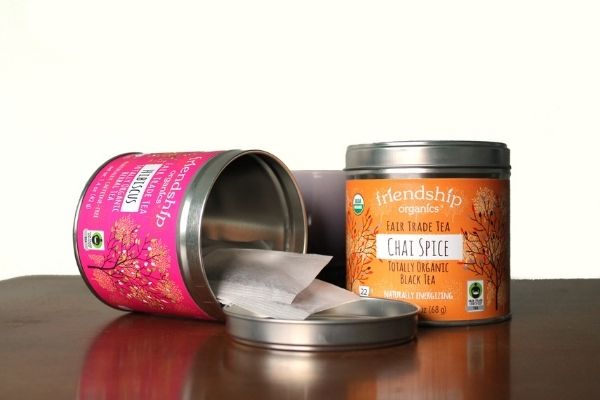
Friendship Organics teas come packaged in one of two ways. (Don’t worry, both options come with the same plastic-free sachets inside!) First, you can purchase a recyclable tin that is guaranteed to keep your tea fresh. And, once you run out of sachets, Friendship Organics offers paper refill packs that let you reuse the original tin and keep packaging waste to a minimum!
Take your pick:
Friendship Organics isn’t just focused on eco-friendly packaging. The company prioritizes sustainability from start to finish, including in the farming practices used to grow its various teas. Friendship Organics products are Fair Trade Certified and Certified Organic in both Canada and the USA.
List of Plastic Free US and Canada Tea Brands
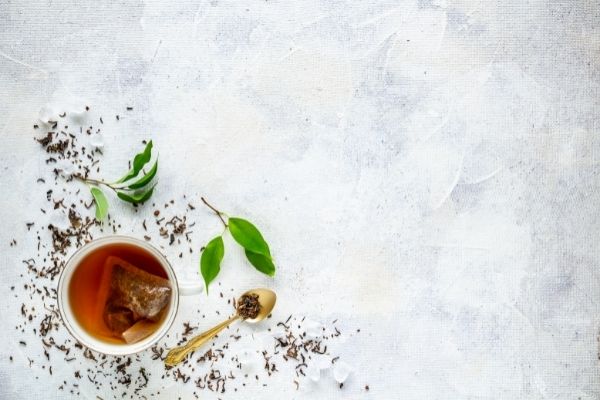
Numi
Numi tea bags are made from a manila hemp and cellulose mix. This is entirely biodegradable and doesn’t contain a trace of polypropylene. These are an excellent option for anyone who likes to just drop their tea bags into their compost bin.
Red Rose
Red Rose tea bags quietly changed in the not too distant past. They are still made from 100% plant materials which the company is very proud of. However, you will find that they are no longer going to break down in your composter at home. The company is pretty cagey about what the tea bags are made of but, it’s a pretty safe bet to assume they are made from PLA. This puts them in the realm of being plastic free. So you don’t need to worry about microplastics in your drink. However, the only sustainable way to dispose of them is to send them for industrial recycling.
Traditional Medicinals
As you might expect from a company that brands itself as all-natural, there are no plastics in their teabags. Instead, traditional Medicinals’ tea bags are a hemp and paper mix sewn together with cotton. In other words, you can happily compost these tea bags at home.
List of Plastic Free Tea Bags UK and Ireland
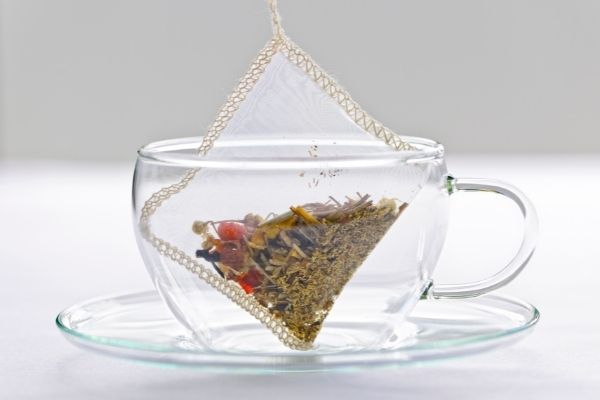
PG Tips
PG tips have made the shift to PLA bags. None of their teabags contain any traces of polypropylene any longer. However, not all of their boxes have been updated to reflect that. But, you can have peace of mind that any of their tea bags you use are industrially compostable.
Sainsbury’s Red Label
Sainsbury’s is in the process of beginning to make a shift. They will be moving to PLA instead of polypropylene. The plan is to start the change from June 2021. So at present, their tea bags do contain plastics. However, as they have stated a date for the shift, I decided to include them on this list. Just don’t expect the rollout to be too quick.
Popular Brands That Are NOT Plastic Free
While there has been a remarkable shift in the industry, not all companies have moved away from plastic yet. Many of the following companies have expressed a desire to change but have not yet started the process of changing their teabags. At the time of writing, the following tea bags still contain polypropylene:
A Few Unanswered Questions
Unfortunately, not all brands are transparent about what they use to make their teabags. As a result, there are still a few brands where it’s not clear what they use in their teabags despite a lot of research. So I’m afraid I can’t give you a definitive answer one way or the other. Personally, I would recommend that you assume they contain plastic if they don’t tell you otherwise.
Here are the popular brands where the plastic status remains unclear:
Frequently Asked Questions
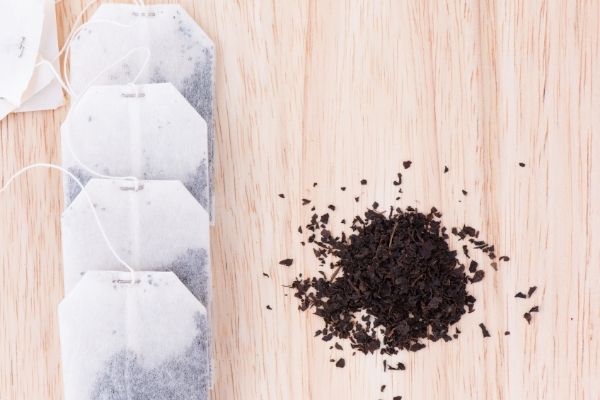
How is plastic used in tea bags?
Plastic can be used as part of the glue that holds the tea bags together. This is the most common use, and the plastic used for this is polypropylene.
However, plastic can also be used as part of the actual fabric of the tea bags.
What are the problems with plastic in tea bags?
There are two main concerns about the presence of plastic in teabags. The first is that when you dispose of your tea bag, the plastic in the bag isn’t going to decompose. It’s just going to sit there.
The other concern is that some of the plastic may leach into the hot water. As a result, you may be inadvertently drinking tiny amounts of microplastics with your tea.
Why is polypropylene bad?
Polypropylene is the most popular packaging material in the world. It’s not just in tea bags. However, only around 1% of it gets recycled. The rest ends up in a landfill. There it takes between 20-30 years to decompose. When it does finally decompose, it will release harmful elements into the surrounding soil.
It’s a triple environmental hit. Firstly it’s made from crude oil and releases a lot of CO2 in its production. Secondly, it hangs around for a long time. Finally, when it does decompose, it releases toxic chemicals.






